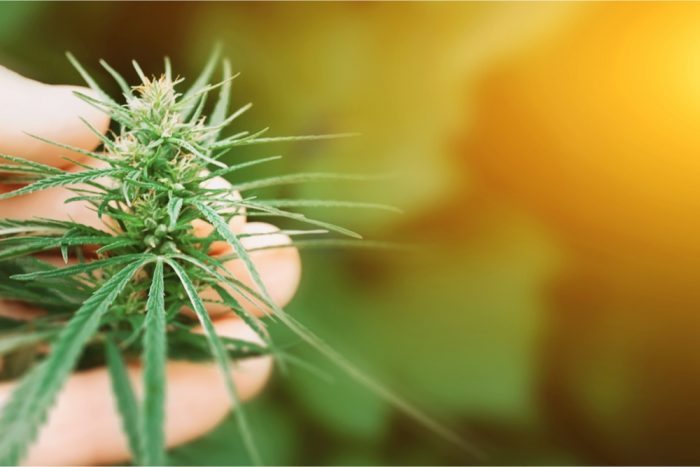Recent cannabis studies have shed more light on the potential wellness benefits of THC.
Medicine is evolving. Health professionals now view THC not just as an intoxicating cannabinoid, but as a potential therapeutic tool. Public interest in the cannabinoid, and its capabilities, has never been stronger. This means that there is an ocean of information to wade through. To simplify things, these are the top 10 potential health benefits of THC under research right now.
1. THC as a Pain Reliever
One of the main reasons people turn to THC is for its pain-relieving effects. THC, or tetrahydrocannabinol, induces its pharmacological effects by interacting with our endcannabinoid receptors also known as CB1 and CB2.
Research reveals that these receptors play a key role in pain management. One study, published in Behavioral Pharmacology (2012), investigated how THC manages cancer pain through the activation of CB1 and CB2 receptors. Impressively, the activation of these receptors resulted in an analgesic effect comparable to the effects of morphine.

Other Studies show that THC facilitates its pain-relieving abilities specifically through the CB1 receptor. When the compound binds to, and activates the CB1, the presynaptic terminal is hyperpolarized. This means that calcium channels close while inhibitory and excitatory neurotransmitters are held back at their synapses. This can modulate opioid release and thus relieve pain.
2. THC Curbs Nausea and Vomiting
Another therapeutic effect that THC is gaining a reputation for is reducing the symptoms of nausea. One early study, published in BMJ (2001), found that patients with nausea self-reported cannabis products to be slightly more effective than traditional nausea medication.
Research suggests that THC’s anti-emetic effects occurs through interaction with the 5-hydroxytryptamine 3 (5-HT3) receptor. The activation of 5-HT3 seems to influence the onset of nausea. With both CB1 and 5-HT3 receptors located on gamma-aminobutyric acid (GABA) neurons where they have an opposing effect on GABA release. GABA is a neurotransmitter that may induce nausea. So when THC activates CB1 it may neutralize the nausea caused by the 5-HT3-activated GABA increase.

3. THC Improves Appetite
Cannabis is famous for inducing “the munchies” or increased hunger, and it seems THC may play a role here too.
Research suggests that the endocannabinoid system regulates eating behavior and studies have demonstrated THC’s ability to increase appetite levels.
CB1 receptors exist in the lateral hypothalamus and these receptors are abundant in neurons that contain orexin and melanin concentration hormone (MCH). These neurons project to dopaminergic neurons where they then modulate the dopaminergic pathway involved with food reward. So, activation of CB1 receptors in these neurons may excite MCH neurons and result in increased appetite.
4. THC as an Effective Sleep Aid
THC may also play a key role in the sleep-wake cycle and act as a sleep inducer. One study, published in Pharmacology Review (2006) found that even low-dose (15mg) of THC had a sedative effect and increased sleep activity.

The CB1 receptor is again thought to play a key role in the facilitation of THC’s effects. One animal study found that the light/dark cycle modulates the activation of the CB1 receptor. This suggests that activation of CB1 by THC may result in a sleep-modulating effect. The fact that CB1 receptors inhabit the pons area of the brainstem — which plays a key role in sleep and dreaming — further solidifies THC and CB1’s role in modulating sleep.
5. Can THC Reduce Stress?
One of the other benefits of THC is its ability to reduce stress-levels thanks to its receptor activation.
By activating cannabinoid receptors, THC may play a key role in the negative feedback of the neuroendocrine stress response. According to studies, cannabinoid-receptor activation inhibits the stress-cascade which results in the release of hormones that let out corticoptropin. This then produces adrenocorticotropin hormones which in turn initiates the production of cortisol, a stress hormone. Complicated yes, but worth investigating if you have problems with stress.
6. THC May Act as an Anti-Depressant
Known for its ability to induce feelings of euphoria, THC has also demonstrated antidepressant-like effects. One study showed that a 2.5mg/kg THC dose resulted in significant antidepressant-like effects in mice.
Research suggests that CB1 receptor plays a key role in facilitating THC’s antidepressant effects. Studies have shown that CB1 activation in mice results in antidepressant-like effects similar to traditional depression medication. Neurochemical changes induced by CB1’s activation in regions of the brain associated with mood may be responsible for these antidepressant effects.

7. THC Kills Cancer Cells in the Lab
One exciting potential effect of THC is its anti-tumor properties.
Evidence shows that the activation of cannabinoid receptors helps to impair the development of cancer cells, so THC may play an important anti-cancer role. Most of these studies are still at the animal stage, but there are a few, like a glioma study in Spain, that have progressed to human clinical trials.
CB1 is also thought to play an important role here, with another study finding that CB1 was the primary receptor involved in reducing cancer cell levels in a prostate cancel culture study. CB1 activation increased activated caspase-3 levels and reduced Bcl-2 levels which resulted in the activation of the apoptotic pathway, leading to the death of cancer cells.
8. THC may Reduce Tumor Growth
In addition to inducing apoptosis in cancer cells, THC may also be able to stop the development of blood vessels (angiogenesis) which are vital for developing a blood supply and growth in tumors.
Cannabinoids stop blood vessel growth — according to research — by blocking the activation of the vascular endothelial growth factor (VEGF) pathway. One study found that the activation of CB1 and CB2 altered blood vessels and decreased VEGF expression.

9. THC Works as Anti-Inflammatory
One of the other benefits of THC is its potential as an anti-inflammatory, thanks again to its activation of the CB1 receptor.
One study showed that the activation of the CB1 receptor in pregnant mic resulted in an increase in the production of cytokine IL-10, an anti-inflammatory cytokine that comes from B-lymphocyte cells.
10. THC May Fight Gum Disease
Gum tissue is another place cannabinoid receptors exist and these may play a role in fighting periodontitis, otherwise known as gum disease.
One animal study on the benefits of THC showed that the activation of CB1 and CB2 receptors led to a reduced periodontal inflammatory response. Another demonstrated that the activation of CB2 led to an anti-inflammatory, osteoprotective, and pro-homeostatic effect in the oral tissue of rats with periodontitis. While smoking cannabis may limit these positive effects, other methods certainly carry gum health benefits.
So there you have it, THC is far more than just an intoxicating substance. Thankfully, in the age we live in, research into the compound’s capabilities will only increase. Watch this space and expect the future to reveal many more ways in which THC can help us all stay healthy.






Louise Lebedynski
your posts are very informative and a blessing to read do you carry any information on Multiple Myaloma cancer and how best to treat it with cannabis oil would appreciate any information
Jennifer Grant
Hello Louise – I’ll see what sort of research is out there on this. Stay tuned.